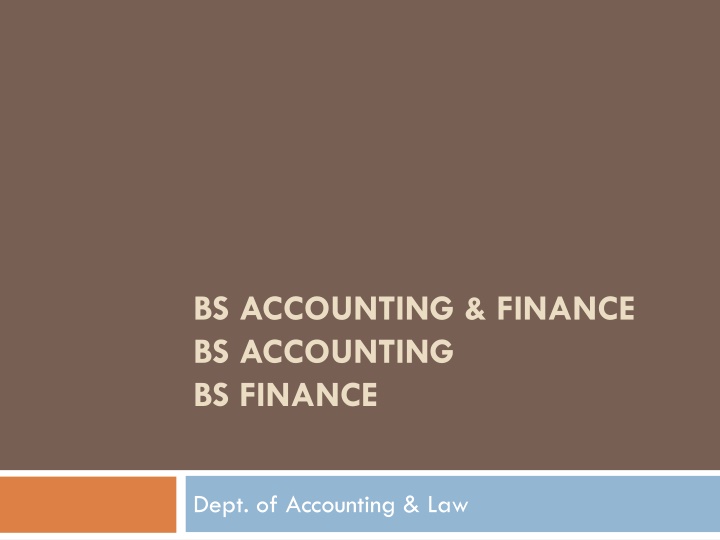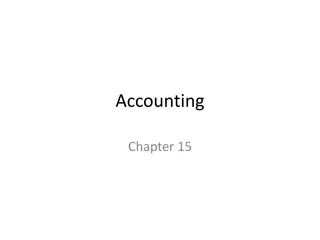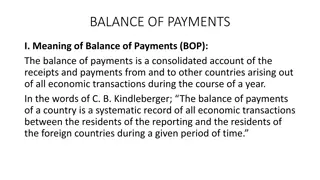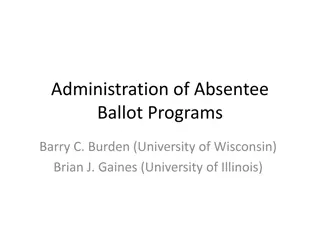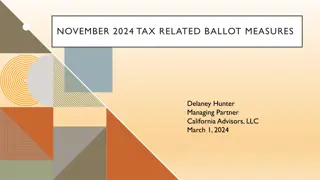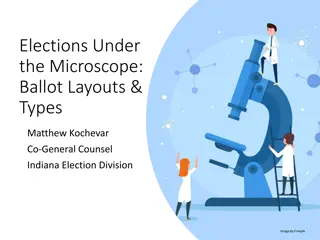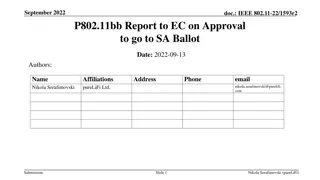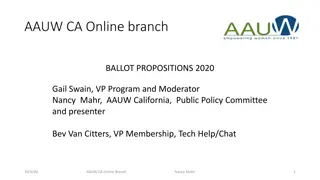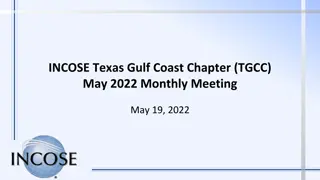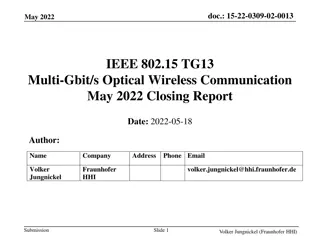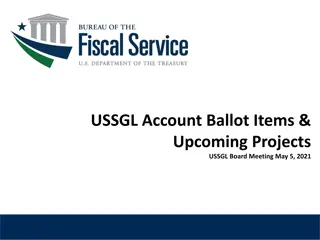USSGL Account Ballot Items & Upcoming Projects for USSGL Board Meeting May 4, 2022
The content provides details about various fiscal year ballot items, modifications, anticipated reimbursements, unapportioned authority, apportionments, and programs exempt from apportionment for fiscal years 2022 and 2023. It covers key aspects related to budgetary resources and accounting specifics discussed in the USSGL Board Meeting on May 4, 2022.
Download Presentation

Please find below an Image/Link to download the presentation.
The content on the website is provided AS IS for your information and personal use only. It may not be sold, licensed, or shared on other websites without obtaining consent from the author.If you encounter any issues during the download, it is possible that the publisher has removed the file from their server.
You are allowed to download the files provided on this website for personal or commercial use, subject to the condition that they are used lawfully. All files are the property of their respective owners.
The content on the website is provided AS IS for your information and personal use only. It may not be sold, licensed, or shared on other websites without obtaining consent from the author.
E N D
Presentation Transcript
BS ACCOUNTING & FINANCE BS ACCOUNTING BS FINANCE Dept. of Accounting & Law
Program Objective To develop Accounting and Finance professionals with world class competencies standards. To provide opportunities for young professionals to acquire not only undergraduate academic degree but Professional certification in Accounting and Finance, under this program. and ethical
Strategy to achieve the Program Objective Design & delivery of courses that provide maximum flexibility to choose their own career path by opting either CA, ACCA, CIMA, CFA, IBP & International credit transfer Main features of the program design are: University foundation courses to broaden knowledge base and improve skills & competencies Rigorous set of core subjects for specializing either in Accounting, Finance or both A broad set of Electives drawn from the IBA undergraduate curriculum with minimum requirements for meeting the criteria for majors Personal effectiveness and development courses to help groom a well rounded personality Internships & attachments specific to the career path Research courses in both Accounting & Finance Intensive use of the technology to equip the graduates with the latest analytical tools & techniques
Preparatory Work Done Course outlines, contents, sequencing, Pre-requisites, course objectives & outcomes developed in close consultation with all the major professional bodies ICAP has, for the first time in their history, have agreed to grant exemptions up to Module D for those who successfully complete this undergraduate degree IBP has waived off appearances at all three levels of examinations and replaced it with only ONE comprehensive examination ACCA has exempted FOUR examinations & review is underway for five more exemptions CFA does not grant, as a principle, any exemptions but close mapping has been done in Finance courses, that facilitate qualifying CFA examinations
Available Options for Students Professional Options Academic Options Students by choosing a single route may opt to become: On academic front, students have two ADDITIONAL options: Chartered Accountant Students can attain a degree of BS in Accounting by taking 3 extra papers of Accounting. Chartered Certified Accountant Chartered Management Accountant Likewise, students also have the option of awarding a degree of BS in Finance by taking 3 extra papers of Finance. Chartered Financial Analyst Junior Associate of bankers Institute of
Professional bodies Partnership ICAP (Exempt up till Module D) ACCA (Exempt up till F4 + Other exemptions [F5-F9] are under consideration) CIMA (Program design supports future exemptions) CFA (Program is structured to cover CFA s curriculum) IBP (Only ONE comprehensive exam replaces all three levels)
Course Layout for Undergraduate students Total Credit Hrs. Credit hrs. for a Major HEC LUMS IBA 124-136 130 51-63 76 130+8* 130+8* 130+8* 88 88 88 BS Accounting & Finance BS Accounting BS Finance * IBA has 16 weeks internship program equivalent to 8 credit hrs. in addition to 130 credit hrs. of course work
Eligibility Criteria & Challenge Test A Higher secondary school certificate with a minimum of 60% marks. A levels with a minimum of 1 B and 2 C s in principal subjects (including Mathematics) such that there should be no grade less than C across the 3 principal subjects. American high school diploma with a minimum of 80% or an international Baccalaureate with at least 30 points out of 45. Entrance Test be based on English and Math only Note: Placement Test (English and Math) will be taken for all the students. Students weak or failing the subject will be given foundation courses of Math and English as pre-requisite before starting the degree courses.
Transfer Students Eligibility Criteria must be met Maximum of 10 courses can be transferred from foreign universities and LUMS Grade of B or better would qualify for the transfer Transfer credits from professional certification will depend on the following: Exams taken for the certification program should be recognized by HEC for course equivalency Transfer credits for ICAP, ACCA, CIMA, CMA and IBP related courses Grading for certification is not relevant as most rely on Pass or Fail only Relative grading to control the passing rate
Courses & Credit Hours (Major: Accounting and Finance) Particulars Courses Credit Hours University core Non-specialized Accounting Finance 4 10 14 14 12 30 44 44 Total 42 130
BS ACCOUNTING AND FINANCE COURSE DIVISION (Total Credit Hours: 130) Accounting 14 Courses: 44 Credit Hours University Core Courses (compulsory requirements) 4 Courses: 12 Credit Hours Non-Specialization Area 10 Courses: 30 Credit Hours (7 courses are mandatory and 3 courses to be chosen from other departments) Mandatory: Introduction to Statistics; MTS102 Statistical Inference; MTS202 Principles of Microeconomics; ECO103 Principles of Macroeconomics; ECO104 Organizational behaviour; MGT221 Principles of Marketing; MKT201 Calculus-1 & Plane geometry; MTS101 Electives: Mathematical methods; MTS112 Foundation of Human Behavior; SSC102 Social Psychology and Self Development; SSC103 Calculus-II and Solid Geometry; MTS201 International Relations; SSC111 Principles of Management; MGT201 Human Resource Management; HRM401 Development Economics; ECO301 Executive leadership; HRM455 Applied Probability; MTS112 Introduction to Econometrics: ECO341 International Trade; ECO412 Finance 14 Courses: 44 Credit Hours English Grammar and Composition; SSC101 Speech Communication; SSC201 Pakistan History ; SSC151 Islamic Studies/ Ethics; SSC301/ SSCXX Core Electives Core Electives 7 Courses: 23 Credit Hours 7 Courses: 21 Credit Hours Advanced Managerial Accounting; ACC310 Financial Reporting; ACC315 Accounting information Systems (For Small to Medium Enterprises); ACC507 Corporate Governance; LAW553 Business Analysis and Decision Making; ACC312 Legal and Regulatory Environment ; LAW501 Strategic Management; MGT552 Auditing; ACC320 Corporate Law; LAW305 Advanced Financial Reporting; ACC401 Essential Software; MIS150 6 Courses: 20 Credit Hours 8 Courses: 24 Credit Hours Principles of Accounting; ACC210 Management Accounting; ACC220 Financial Accounting; ACC215 Taxation (Direct & Indirect); LAW303 Business Law; LAW205 Independent study (Accounting); ACC301 4 CREDIT HRS. Computer Applications; MIS103/ACC222 4 CREDIT HRS. Introduction to Business Finance; FIN201 Financial Institutions and Markets; FIN301 Regulations & Financial Markets; FIN558 Financial Management; FIN401 Financial Modeling; FIN574 4 CREDIT HRS. Independent study (Finance); FIN310 4 CREDIT HRS. Investment Banking; FIN451 Treasury and Funds Management; FIN565 Financial Risk Management; FIN456 Advance Portfolio Management and Wealth Planning; FIN563 Corporate Finance; FIN454 Financial Econometrics; FIN569 Public Finance; ECO451 Alternative Investments; FIN305 Real Estate Investments: Analysis and Financing; FIN308 International Banking; FIN310 Behavioral Finance (with lab- 4 credit); FIN312 Venture Capital and the Finance of Innovation; FIN405 Buyouts and Acquisitions; FIN410 Corporate Restructuring; FIN315 Empirical Research in Finance; FIN320 Advanced Corporate Finance; FIN560 International Finance; FIN452
BS ACCOUNTING AND FINANCE COURSE DIVISION (Total Credit Hours: 130) Accounting 14 Courses: 44 Credit Hours University Core Courses (compulsory requirements) 4 Courses: 12 Credit Hours Non-Specialization Area 10 Courses: 30 Credit Hours (7 courses are mandatory and 3 courses to be chosen from other departments) Electives: Global Economic and Political Environment; ECO517 Marketing management; MKT501 Politics & Law; LAW105 Business mathematics & linear Algebra; MTS211 Finance 14 Courses: 44 Credit Hours Core Electives Core Electives 7 Courses: 23 Credit Hours 7 Courses: 21 Credit Hours Data Mining; ACC325 Tax Management and Optimization; LAW401 Actuarial Courses; ACC415 FCS basic Programming related courses; ACC416 6 Courses: 20 Credit Hours 8 Courses: 24 Credit Hours Security Analysis (4 credit-lab); FIN453 Fixed Income Investments; FIN425 Derivatives; FIN457 Portfolio Management (4 credit-lab); FIN455 Branch banking; FIN425 Lending- Products, operations & risk management; FIN426 Finance of international trade & related treasury operations; FIN427 Marketing of financial services; FIN428 Information technology in Financial services; FIN429 CA & ACCA s Professional Requirement CFA s Professional Requirement IBP s Professional Requirement
Courses & Credit Hours (Major: Accounting) Particulars Courses Credit Hours University core Non-specialized Accounting Finance 4 10 17 11 12 30 53 35 Total 42 130
BS ACCOUNTING COURSE DIVISION (Total Credit Hours: 130) Accounting 17 Courses: 53 Credit Hours University Core Courses (compulsory requirements) 4 Courses: 12 Credit Hours Non-Specialization Area 10 Courses: 30 Credit Hours (7 courses are mandatory and 3 courses to be chosen from other departments) Mandatory: Introduction to Statistics; MTS102 Statistical Inference; MTS202 Principles of Microeconomics; ECO103 Principles of Macroeconomics; ECO104 Organizational behaviour; MGT221 Principles of Marketing; MKT201 Calculus-1 & Plane geometry; MTS101 Electives: Mathematical methods; MTS112 Foundation of Human Behavior; SSC102 Social Psychology and Self Development; SSC103 Calculus-II and Solid Geometry; MTS201 International Relations; SSC111 Principles of Management; MGT201 Human Resource Management; HRM401 Development Economics; ECO301 Executive leadership; HRM455 Applied Probability; MTS112 Introduction to Econometrics: ECO341 International Trade; ECO412 Finance 11 Courses: 35 Credit Hours English Grammar and Composition; SSC101 Speech Communication; SSC201 Pakistan History ; SSC151 Islamic Studies/ Ethics; SSC301/ SSCXX Core Electives 10 Courses: 30 Credit Hours Core Electives 7 Courses: 23 Credit Hours 6 Courses: 20 Credit Hours 5 Courses: 15 Credit Hours Principles of Accounting; ACC210 Management Accounting; ACC220 Financial Accounting; ACC215 Taxation (Direct & Indirect); LAW303 Business Law; LAW205 Independent study (Accounting); ACC301 4 CREDIT HRS. Computer Applications; MIS103/ACC222 4 CREDIT HRS. Advanced Managerial Accounting; ACC310 Financial Reporting; ACC315 Accounting information Systems (For Small to Medium Enterprises); ACC507 Corporate Governance; LAW553 Business Analysis and Decision Making; ACC312 Legal and Regulatory Environment ; LAW501 Strategic Management; MGT552 Auditing; ACC320 Corporate Law; LAW305 Advanced Financial Reporting; ACC401 Essential Software; MIS150 Introduction to Business Finance; FIN201 Financial Institutions and Markets; FIN301 Regulations & Financial Markets; FIN558 Financial Management; FIN401 Financial Modeling; FIN574 4 CREDIT HRS. Independent study (Finance); FIN310 4 CREDIT HRS. Investment Banking; FIN451 Treasury and Funds Management; FIN565 Financial Risk Management; FIN456 Advance Portfolio Management and Wealth Planning; FIN563 Corporate Finance; FIN454 Financial Econometrics; FIN569 Public Finance; ECO451 Alternative Investments; FIN305 Real Estate Investments: Analysis and Financing; FIN308 International Banking; FIN310 Behavioral Finance (with lab- 4 credit); FIN312 Venture Capital and the Finance of Innovation; FIN405 Buyouts and Acquisitions; FIN410 Corporate Restructuring; FIN315 Empirical Research in Finance; FIN320 Advanced Corporate Finance; FIN560 International Finance; FIN452
BS ACCOUNTING COURSE DIVISION (Total Credit Hours: 130) Accounting 17 Courses: 53 Credit Hours University Core Courses (compulsory requirements) 4 Courses: 12 Credit Hours Non-Specialization Area 10 Courses: 30 Credit Hours (7 courses are mandatory and 3 courses to be chosen from other departments) Electives: Global Economic and Political Environment; ECO517 Marketing management; MKT501 Politics & Law; LAW105 Business mathematics & linear Algebra; MTS211 Finance 11 Courses: 35 Credit Hours Core Electives 10 Courses: 30 Credit Hours Core Electives 7 Courses: 23 Credit Hours 6 Courses: 20 Credit Hours 5 Courses: 15 Credit Hours Data Mining; ACC325 Tax Management and Optimization; LAW401 Actuarial Courses; ACC415 FCS basic Programming related courses; ACC416 Security Analysis (4 credit-lab); FIN453 Fixed Income Investments; FIN425 Derivatives; FIN457 Portfolio Management (4 credit-lab); FIN455 Branch banking; FIN425 Lending- Products, operations & risk management; FIN426 Finance of international trade & related treasury operations; FIN427 Marketing of financial services; FIN428 Information technology in Financial services; FIN429 CA & ACCA s Professional Requirement CFA s Professional Requirement IBP s Professional Requirement
Courses & Credit Hours (Major: Finance) Particulars Courses Credit Hours University core Non-specialized Accounting Finance 4 10 11 17 12 30 35 53 Total 42 130
BS FINANCE COURSE DIVISION (Total Credit Hours: 130) Accounting 11 Courses: 35 Credit Hours University Core Courses (compulsory requirements) 4 Courses: 12 Credit Hours Non-Specialization Area 10 Courses: 30 Credit Hours (7 courses are mandatory and 3 courses to be chosen from other departments) Mandatory: Introduction to Statistics; MTS102 Statistical Inference; MTS202 Principles of Microeconomics; ECO103 Principles of Macroeconomics; ECO104 Organizational behaviour; MGT221 Principles of Marketing; MKT201 Calculus-1 & Plane geometry; MTS101 Electives: Mathematical methods; MTS112 Foundation of Human Behavior; SSC102 Social Psychology and Self Development; SSC103 Calculus-II and Solid Geometry; MTS201 International Relations; SSC111 Principles of Management; MGT201 Human Resource Management; HRM401 Development Economics; ECO301 Executive leadership; HRM455 Applied Probability; MTS112 Introduction to Econometrics: ECO341 International Trade; ECO412 Finance 17 Courses: 53 Credit Hours English Grammar and Composition; SSC101 Speech Communication; SSC201 Pakistan History ; SSC151 Islamic Studies/ Ethics; SSC301/ SSCXX Core Electives Core Electives 7 Courses: 23 Credit Hours 4 Courses: 12 Credit Hours Advanced Managerial Accounting; ACC310 Financial Reporting; ACC315 Accounting information Systems (For Small to Medium Enterprises); ACC507 Corporate Governance; LAW553 Business Analysis and Decision Making; ACC312 Legal and Regulatory Environment ; LAW501 Strategic Management; MGT552 Auditing; ACC320 Corporate Law; LAW305 Advanced Financial Reporting; ACC401 Essential Software; MIS150 6 Courses: 20 Credit Hours 11 Courses: 33 Credit Hours Principles of Accounting; ACC210 Management Accounting; ACC220 Financial Accounting; ACC215 Taxation (Direct & Indirect); LAW303 Business Law; LAW205 Independent study (Accounting); ACC301 4 CREDIT HRS. Computer Applications; MIS103/ACC222 4 CREDIT HRS. Introduction to Business Finance; FIN201 Financial Institutions and Markets; FIN301 Regulations & Financial Markets; FIN558 Financial Management; FIN401 Financial Modeling; FIN574 4 CREDIT HRS. Independent study (Finance); FIN310 4 CREDIT HRS. Investment Banking; FIN451 Treasury and Funds Management; FIN565 Financial Risk Management; FIN456 Advance Portfolio Management and Wealth Planning; FIN563 Corporate Finance; FIN454 Financial Econometrics; FIN569 Public Finance; ECO451 Alternative Investments; FIN305 Real Estate Investments: Analysis and Financing; FIN308 International Banking; FIN310 Behavioral Finance (with lab- 4 credit); FIN312 Venture Capital and the Finance of Innovation; FIN405 Buyouts and Acquisitions; FIN410 Corporate Restructuring; FIN315 Empirical Research in Finance; FIN320 Advanced Corporate Finance; FIN560 International Finance; FIN452
BS FINANCE COURSE DIVISION (Total Credit Hours: 130) Accounting 11 Courses: 35 Credit Hours University Core Courses (compulsory requirements) 4 Courses: 12 Credit Hours Non-Specialization Area 10 Courses: 30 Credit Hours (7 courses are mandatory and 3 courses to be chosen from other departments) Electives: Global Economic and Political Environment; ECO517 Marketing management; MKT501 Politics & Law; LAW105 Business mathematics & linear Algebra; MTS211 Finance 17 Courses: 53 Credit Hours Core Electives Core Electives 7 Courses: 23 Credit Hours 4 Courses: 12 Credit Hours Data Mining; ACC325 Tax Management and Optimization; LAW401 Actuarial Courses; ACC415 FCS basic Programming related courses; ACC416 6 Courses: 20 Credit Hours 11 Courses: 33 Credit Hours Security Analysis (4 credit-lab); FIN453 Fixed Income Investments; FIN425 Derivatives; FIN457 Portfolio Management (4 credit-lab); FIN455 Branch banking; FIN425 Lending- Products, operations & risk management; FIN426 Finance of international trade & related treasury operations; FIN427 Marketing of financial services; FIN428 Information technology in Financial services; FIN429 CA & ACCA s Professional Requirement CFA s Professional Requirement IBP s Professional Requirement
Recommended Semester-wise sequence of Courses Semester 2 Semester 1(Mandatory) No. 1 2 3 4 5 6 Course code SSC101 SSC201 SSC151 SSC301/SSCXX MTS102 ECO103 No. 1 2 3 4 5 6 Course code MTS202 ECO104 MGT221 MKT201 MTS101 NS-Elective
Recommended Semester-wise sequence of Courses Semester 3 Semester 4 No. 1 2 3 4 5 6 Course code NS-Elective NS-Elective ACC210 FINC201 ACC220 FIN301 No. 1 2 3 4 5 6 Course code ACC215 FIN558 LAW301 LAW205 FIN401 MTS103
Semester 5 8 Students choosing Electives during this time period including an 8 weeks internship program. have the option of
Challenges Ensuring Uniformity & Continuity in Standardization of Course Outlines Lectures & Exams Preparation & teaching of Pakistan based Case studies Upgrade technology from time to time to remain ahead of the competitors Hiring faculty resource of high caliber
Administrative structure to meet these Challenges Professional Advisory Committee Employers Advisory Committee Dept. of Accounting & Law
Roles This 9 members consultative committee consists of representatives of professional bodies, banks & academia. It is established to perform the following tasks: Professional Advisory Committee Monitor the curriculum. Establish a framework to Operationalize this program as per the desired vision. Bridge the gap between Academia & professional bodies
Roles This committee will consist of Employers from various organizations. The prospective members have been identified and we are in the process of obtaining their approval. This committee will perform the following tasks: Employers Advisory Committee Employers will highlight the expected skills level & adaptability of these graduates in the dynamic business world. This committee will suggest the improvements in the curriculum & practical training.
Roles Coordinator has the following responsibilities: Coordinator To Operationalize the recommendations of both committees. To perform his duties under directives of the Chairpersons of departments of Accounting & Finance. Continuous monitoring of curriculum, lectures & related matters to ensure standardization.
